Growing beard hair is the pinnacle of masculine charisma and representation of knowledge and appeal. How to stop your beard from itching, or is it a side effect of the quest for a gorgeous face mane? Even the most steadfast people can get completely insane with the constant impulse of a beard itch.
But do not worry, we will clarify the fundamental causes of this beard dilemma, and help you understand how to address them.
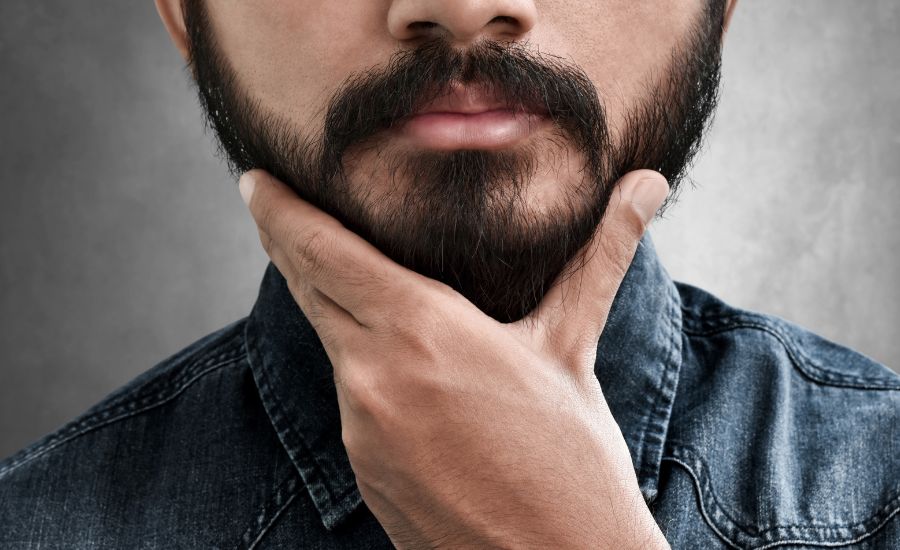
Why and how to stop your beard from itching?
The beard hair is also called androgenic hair, growing it is an opportunity to showcase masculinity for many men and embrace their unique style. The process is smooth until your perfect beard starts itching, an itchy beard can be caused by several factors, some of the most likely ones will be examined.
Beard dandruff
Dandruff, commonly referred to as “beardruff”, is a typical problem that many men with beards have.
You may experience constant itchiness and pain from this irritating condition, which may cause you to doubt the very nature of your facial hairs.
It develops when your beard’s base skin dries out and sheds its dead skin cells. These tiny, noticeable skin flakes can build up in your beard, producing a messy appearance.
The skin becomes dry and prone to flaking when the natural oils and hydration are gone. These essential oils can be stripped away by elements like inclement weather, hot showers, and excessive washing, which exacerbates the problem.
Your skin’s natural oil, or sebum, is vital to preserving the health and moisture of your skin. But uneven sebum production can cause oily or dry skin, both of which can exacerbate dead skin cells.
Dandruff on the beard occasionally results from bacterial or fungal infection. Redness, flaking, and a beard itch can be brought on by an underlying skin condition like seborrheic dermatitis, a common scalp ailment, which can also affect the area underneath your beard and cause an uncomfortable hair growth process.
Poor beard hygiene
Poor beard hygiene is frequently to blame for this discomfort since failing to maintain and care for your beard properly can result in a variety of issues that itch and irritate your skin.
If you don’t frequently clean your beard, this deposit can collect and serve as a haven for bacteria. The growth of germs can result in irritation, redness, and finally itching.
Poor cleanliness habits might upset the equilibrium and cause an excess of oils to be produced. A buildup of sebum and oil can clog hair follicles, trapping dead skin cells and encouraging the development of yeast, which can irritate and itch.
Good maintenance of your facial hair, which includes routine washing and exfoliating, helps control oil production and prevents and maintains the health of both your facial hair and the beard soft underlying skin.
Regular trimming and shaping of your beard hairs prevent uneven growth, stray hairs, and twisted knots, which may also lead to itching.
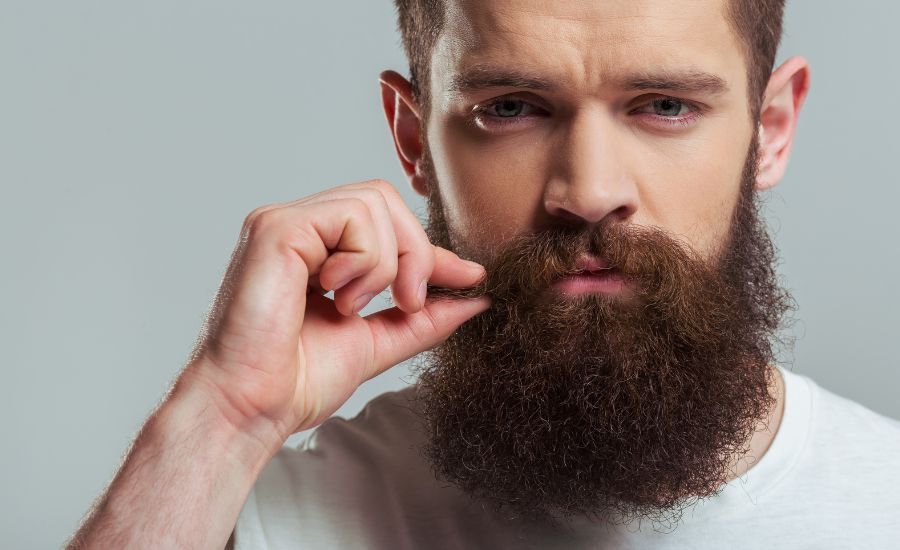
Allergic reactions
Allergies arise when the immune system of the body overreacts to particular substances, causing several uncomfortable symptoms.
Allergens frequently trigger allergic reactions. In the context of beard itching, ingredients in beard care products, such as scents, preservatives, or certain oils, may be allergies.
Some people may develop allergies or sensitivities to these substances, which can lead to an itchy beard.
It might be difficult to identify an allergic reaction to beard care products because symptoms can differ from person to person.
Common symptoms of an allergic reaction include hives, rash, itchy skin, and red, dry, or irritated skin. When exposed to the allergen repeatedly, symptoms may start immediately or slowly over time.
You may lessen the discomfort of an allergic reaction and enjoy a beard that is both fashionable and irritation-free by being aware of potential allergies, performing patch tests, and asking for professional advice when necessary.
Dry skin
The skin underneath your beard needs enough moisture to be hydrated and supple. It loses its natural moisture barrier when it dries up, making it more prone to irritation and itching. Dryness can be worsened by elements such as cold temperatures, low humidity, and frequent washing.
Itchy skin and beards can also be caused by environmental causes such as exposure to inclement weather, dry air, and toxins.
You might develop even more dry skin by losing moisture due to the wind, sun, and high temperatures. Environmental toxins can also irritate the skin, leading to dry skin, irritation, and itching.
Your skin’s moisture levels may suffer from inadequate hydration. Your entire body, including your skin, is affected by dehydration. Dry, tight, and itchy skin can be a sign that your body needs more water.
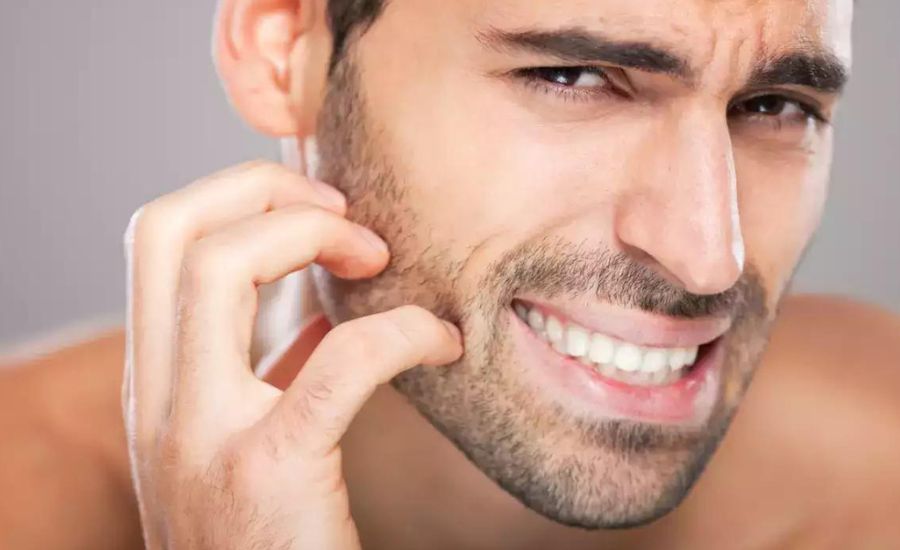
Skin conditions
A variety of skin conditions can make you develop a beard itch, which can be upsetting and make you want to seek relief. You can solve the problem successfully if you understand how these skin disorders contribute to discomfort.
Eczema: Eczema affects the area covered by facial skin and hair. Eczema is thought to be brought on by a combination of genetic and environmental factors, while its exact cause is unknown.
Psoriasis: Chronic autoimmune illness psoriasis speeds up skin cell renewal, resulting in an overgrowth of cells on the surface.
Psoriasis can cause red, scaly spots that itch when it affects the beard area. Individual differences in severity and symptoms exist, but aggravating factors include stress, fungal infections, and some drugs.
Hair follicles: Since each hair follicle is surrounded by nerve endings, different stimuli may cause them to become sensitive. Itching can occur when these nerve terminals are activated or inflamed.
This sensitivity can be activated and result in beard itching by elements like dryness, friction, and trapped dirt or debris.
Ingrown hairs
Ingrown hair occurs when the beard hair curls back or grows sideways into the skin instead of growing outward, they can cause irritation and beard itch.
Facial ingrown hairs also can result from shaving too closely or against the grain, which traps the hair beneath the skin’s surface.
Beard hair that is curly or coarse is more likely to become ingrown hair again.
Particularly after shaving or cutting, the hair’s natural curl or thickness might lead it to loop back into the skin.
The buildup of dead skin cells on the skin’s surface can obstruct the hair follicles and hinder healthy, hair growth and development. A hair that tries to get past the obstruction may become caught, leading to ingrown hairs.
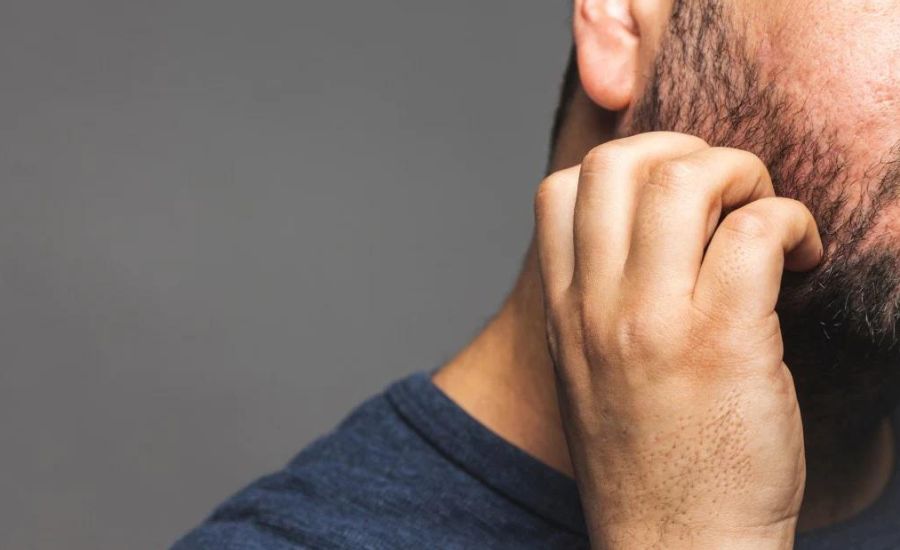
How to stop and prevent beard itch
Now that you know the causes of an itchy beard, let’s explore the remedies and provide you with a range of practical tips and itchy beard remedies to stop the itch and prevent it from recurring.
Regular trimming
Regular trimming is a critical component of beard maintenance that is sometimes disregarded. Beard trimming is essential for eliminating itching as well as maintaining the form and style of your beard.
The hair strands in your beard may deteriorate as it develops, leading to split ends and dryness.
These broken hairs are more likely to fall out and might itch and irritate people. To prevent split ends from moving up the hair shaft and causing itching, regular trimming helps remove them.
A long, dense beard can collect perspiration, grime, and moisture next to the skin, fostering bacterial growth and irritability.
Regular beard trimming and application of beard oil keep it at a moderate length, help avoid ingrown hairs, and prevent the accumulation of moisture and dirt. This lowers the likelihood of itching by promoting a healthier and cleaner environment.
A healthy diet and hydration
Your nutrition is one factor that is commonly disregarded yet is crucial for maintaining a healthy beard.
Essential nutrients are needed for your beard to grow and stay healthy. For robust and durable facial hair, a diet high in vitamins, minerals, and proteins is essential.
Water consumption is also crucial for overall health and can help maintain healthy beard hairs. By keeping your skin and hair follicles moistened, hydration can lessen dryness and stave off itchy beards. Aim to consume eight glasses of water or more each day to stay well hydrated.

Cleanliness
The key to avoiding itching and keeping healthy, comfortable facial hair is to keep your beard clean.
You need to keep your beard clean always to get rid of dirt, debris, and extra oils that might build up throughout the day, just like the hair on your head.
Wash your beard two to three times each week with a gentle shampoo or a beard-specific mild cleanser.
A strong beard shampoo or beard oil that strips away natural oils should be avoided since this can cause dryness and itching.
Make sure your beard is completely dry after cleansing. If there is too much moisture in the beard, it can produce a moist environment that encourages the growth of germs and fungal infection, which may make the beard itchy.
To completely remove moisture, gently wipe your beard dry with a fresh towel, or use a hair dryer set to low heat.
Use quality materials
Investing in high-quality products can significantly improve comfort when growing a beard by reducing beard itch. A good beard brush or comb should be one of your grooming essentials.
Choose combs or brushes with natural bristles like wooden teeth or boar’s teeth. These materials are kind to skin and beard, lowering the possibility of rashes and itching.
Moisturizing the facial hairs is essential for avoiding dryness and itching. Be sure to choose hydrating items created with high-quality components, such as good beard oil, beard wash, beard balm, and beard brush.
Look for oils that will hydrate, nourish, and act as a barrier for your beard, such as good beard oil, aloe vera products, and coconut oil.
Avoid products with harsh chemicals or artificial perfumes because they might irritate your skin and make itchy skin worse.
Pick mild, high-quality products that are ideal for your skin type and hair type.
Your daily interactions with materials can also have an impact on the health of your beard. Choose breathable pillowcases made of cotton or silk.
These materials can stop beard itch and help minimize hair breakage since they are less prone to generate friction.
In a similar vein, pat your beard dry with clean, soft towels rather than rubbing it harshly, which might irritate it.
The products you use to maintain your beard can have a big impact on reducing itchiness and help you treat dry skin. Give your beard the attention it needs and embrace the power of high-quality materials.
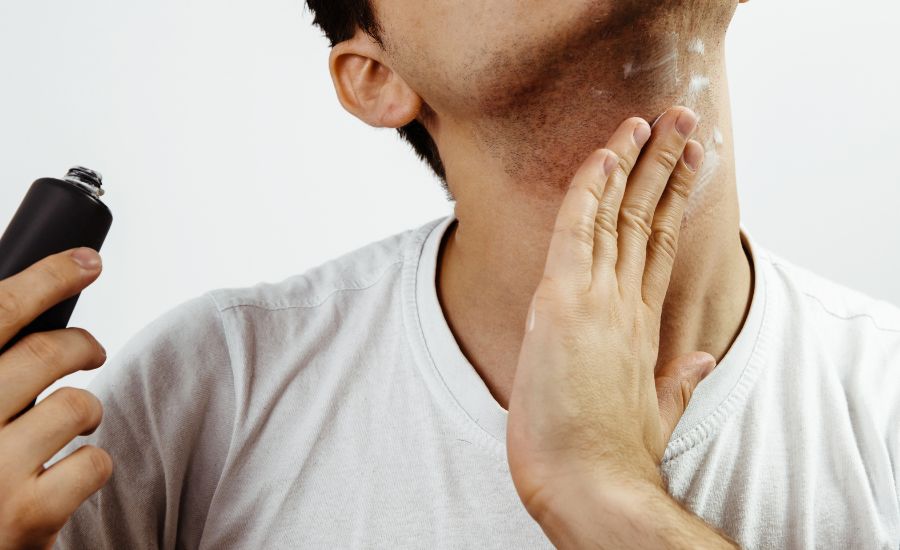
FAQ
Why is my beard so itchy?
You can develop a beard itch due to poor beard hygiene, lack of proper cleaning and maintenance of your beard hair is most likely to be the cause of your beard itch.
What can I put on my beard to stop itching?
Regular moisturizing and using a top beard shampoo and beard conditioner can help you maintain an itch-free beard.
Do beards ever stop itching?
Yes, most people only experience beard itching during the first month when growing a beard, However, proper maintenance is essential to prevent a beard itch.
Should you scratch an itchy beard?
Scratching an itchy beard is not recommended to stop beard itch as it can expose your skin to bacterial infections, better approaches to this situation are explained above.
Conclusion
It’s vital to keep in mind that figuring out the precise source of your dreaded beard itch will help you find the finest answers and remedies.
If the itching persists or becomes severe, consulting a dermatologist for further evaluation is vital, they might suggest other professional approaches like laser hair removal or surgery.

